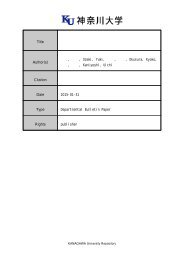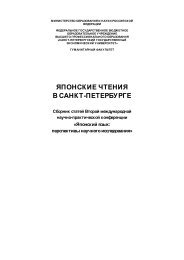to Learners with Special Educational Needs
e-textbook SEN
e-textbook SEN
You also want an ePaper? Increase the reach of your titles
YUMPU automatically turns print PDFs into web optimized ePapers that Google loves.
Pokrivčáková, S. et al. (2015). Teaching Foreign Languages <strong>to</strong> <strong>Learners</strong> <strong>with</strong> <strong>Special</strong> <strong>Educational</strong> <strong>Needs</strong>:<br />
e-textbook for foreign language teachers. Nitra: Constantine the Philosopher University. 128 p.<br />
ISBN 978-80-558-0941-0<br />
Research results<br />
Most research studies confirmed the debilitating effect of FLA on FL learning. What is more, it<br />
has been documented that the relationship between FLA and FL achievement can be affected by<br />
a number of other fac<strong>to</strong>rs.<br />
Research has also examined how FLA and FL achievement are related <strong>to</strong> a number of<br />
variables, such as age, length of FL study, gender, living or staying in a FL country, academic<br />
achievement, other FLs learned, self-perceived FL proficiency, perceived self-worth, and<br />
perfectionism (Kunt & Tüm, 2010). Perhaps one of the most interesting findings of this research<br />
is that advanced learners and learners who have lived or stayed in a FL country are more<br />
susceptible of FLA (Onwuegbuzie et al., 1999; Kitano, 2001; Gregersen & Horwitz, 2002). Kitano<br />
(2001) found a relationship between gender and the anxiety – male learners, who perceived<br />
themselves as less competent in FL, suffered from FLA more than female learners.<br />
Most research has proven that there is a negative correlation between FLA and FL<br />
achievement in a large number of contexts and situations (Horwitz, 1986; Horwitz, 1996; Kunt,<br />
1997; Yan, 1998; Sellers, 2000; Kitano, 2001; Yan & Wang, 2001). Anxiety also has negative<br />
influence on the three stages of cognitive processing: input, processing and output (MacIntyre &<br />
Gardner, 1991). Furthermore, a number of studies have examined FLA in relation <strong>to</strong> specific<br />
language skills, such as reading, listening, writing, and speaking (Sai<strong>to</strong> & Samimy, 1996; Cheng,<br />
1998; Cheng, Horwitz & Schallert, 1999; Sai<strong>to</strong>, Horwitz & Garza, 1999; Sellers, 2000; Argaman &<br />
Abu-Rabia, 2002; Cheng, 2002; Elkhafaifi, 2005). Dixson (1991) found out that while listening,<br />
anxious students had difficulty <strong>to</strong> comprehend the content of the target language. Sellers (2000)<br />
investigated the relationship between anxiety and reading and concluded that anxious students<br />
do not understand the tasks correctly and tend <strong>to</strong> recall less passage content while reading than<br />
their less anxious mates. As regards speaking, more anxious students produce longer texts and<br />
smaller continuous speech and make longer mid-clause pauses (Djigunovic, 2006). All of these<br />
studies provide evidence for the existence of skill-specific FLA.<br />
More recently, Baran-Łucarz (2013) has investigated the effect of anxiety on the learning of<br />
phonetics – Phonetics Learning Anxiety – which represents an interesting step in the<br />
understanding of the impact of affective fac<strong>to</strong>rs on pronunciation. She points out that no<br />
instrument has been designed yet <strong>to</strong> examine specifically the pronunciation anxiety (Baran-<br />
Łucarz, 2013, p. 60-61).<br />
Horwitz et al. (1986) have developed “Foreign Language Classroom Anxiety Scale” (FLCAS) <strong>to</strong><br />
measure the amount of anxiety by students. The scale has 33 items scored on a 5-point Likert<br />
scale ranging from “strongly agree” <strong>to</strong> “strongly disagree” and it consists of three components:<br />
communication apprehension, test anxiety, and fear of negative evaluation. The possible range<br />
is from 33 <strong>to</strong> 165. The higher score, the more anxious the individuals are.<br />
The questions of FLCAS are presented in the table below (Horwitz et al., 1986).<br />
1. I never feel quite sure of myself when I am speaking in my foreign language class.<br />
2. I don´t worry about making mistakes in language class.<br />
3. I tremble when I know that I´m going <strong>to</strong> be called on in language class.<br />
4. It frightens me when I don´t understand what the teacher is saying in the foreign<br />
language.<br />
5. It wouldn´t bother me at all <strong>to</strong> take more foreign language classes.<br />
6. During language class, I find myself thinking about things that have nothing <strong>to</strong> do <strong>with</strong> the<br />
course.<br />
7. I keep thinking that the other students are better at languages than I am.<br />
8. I am usually at ease during tests in my language class.<br />
9. I start <strong>to</strong> panic when I have <strong>to</strong> speak <strong>with</strong>out preparation in language class.<br />
10. I worry about the consequences of failing my foreign language class.<br />
11. I don´t understand why some people get so upset over foreign language classes.<br />
12. In language class I can get nervous I forget things I know.<br />
94






